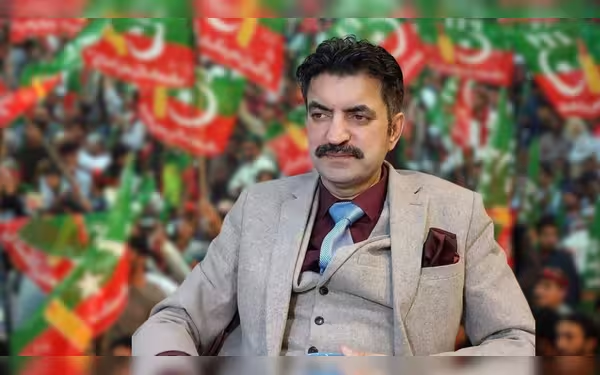Saturday, November 16, 2024 09:59 PM
Sher Afzal Marwat's Health Issues Spark Controversy During PTI Protest
- Sher Afzal Marwat cites health issues for absence.
- PTI leaders face backlash for missing protest.
- Public presence crucial for political accountability.
 Image Credits: thecurrentpk
Image Credits: thecurrentpkSher Afzal Marwat's health issues lead to criticism of PTI leaders for their absence during a significant protest in Islamabad.
In recent events surrounding the political landscape of Pakistan, the absence of key leaders from the Pakistan Tehreek-e-Insaf (PTI) during a significant protest has sparked considerable debate and disappointment among party supporters. The protest, which took place on Saturday, was expected to draw a large crowd, especially after the Chief Minister of Khyber Pakhtunkhwa, Ali Amin Gandapur, opted to visit the KP House instead of joining the demonstrators at D-Chowk in Islamabad. This decision not only raised eyebrows but also led to a wave of criticism directed at the PTI leadership.
Among those criticized were prominent figures such as Ali Muhammad Khan, former National Assembly Speaker Asad Qaiser, opposition leader Omer Ayub Khan, and Sher Afzal Khan Marwat. Their absence did not go unnoticed, as many supporters took to social media to express their frustration. Comments such as "Were they doing work from home?" highlighted the growing discontent among the party's base, who expected their leaders to stand in solidarity during crucial moments.
Sher Afzal Khan Marwat, one of the leaders who faced backlash, cited health issues as the reason for his absence. While health concerns are valid, the timing of such issues raises questions about the commitment of PTI leaders to their supporters and the cause they represent. In a political environment where public presence can significantly influence party morale, the absence of these leaders may have lasting implications.
The situation reflects a broader challenge within political parties in Pakistan, where the expectations of supporters often clash with the realities faced by leaders. As political dynamics continue to evolve, it is essential for leaders to maintain a visible presence, especially during protests that symbolize the party's stance on critical issues.
The recent protest and the subsequent criticism of PTI leaders underscore the importance of accountability and visibility in politics. As supporters look to their leaders for guidance and representation, it is crucial for those in power to prioritize their presence in times of need. The political landscape is ever-changing, and the actions of today will undoubtedly shape the perceptions and loyalty of supporters in the future.













